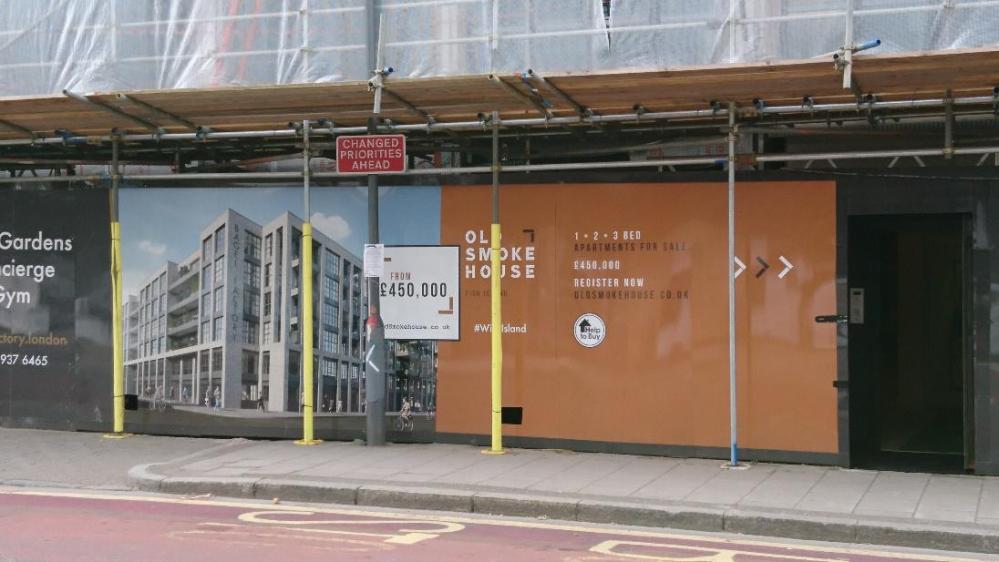

Hackney Quest do brilliant things in E9 for Hackney youth. Those who spend most time with our young people are the ones who’re most positive about them. There’s a real buzz about this community hub; more and more I realise what an incredible job youth workers do, with less and less resource from central government (see London Councils). A regular face at Hackney Quest is Luke Billingham, who you might spot around Hackney, deep in conversation with a teenager he’s supporting.
His Twitter feed is yet another lesson in how things really are on the street, rather than how they’re presented to us. Young people are working with advocates like Luke on solutions to things like violent crime, yet they face massive systemic inequality of opportunity and their recommendations go unheard. But let someone who really knows the story tell you about his own Hackney Changemaker journey…
“Inequality and rage
Hackney has always been unequal. When its slums were cleared in the 1930s, it was a sign of inequality. When Homerton College moved to Cambridge from Hackney in 1894 because “poverty and over-crowding was rife”, it was a sign of inequality. I doubt it was wonderfully egalitarian back when it was Saxon settlement, either. That doesn’t mean it has to stay quite so hideously unequal today.
I was born in Homerton Hospital in 1991, and lived in Hackney all through my childhood and adolescence. Its inequality struck me from a young age: when going round friends’ houses in primary school, it’s hard not to notice that some are large houses by a huge, beautiful park, but that more of them are pokey flats, occupied by whole families. I was baffled by this as a youngster – how could kids who seemed equal to me in every other way be “allowed” to live in such different conditions? I knew I was lucky to live in a small terraced house.
I went to a brilliant local Hackney primary school (St John of Jerusalem), then to Latymer, a grammar school in Enfield, then to Cambridge. Once, when playing football at Cambridge, an opposition player – who had a recognisably public school accent – said something racist to a teammate of mine, who was Irish. Across the pitch, I yelled “Oi poshboy! Leave him alone you #@*&!” My friend told me I sounded like a Dickensian cockney urchin, telling a wealthy businessman he’d one day get his comeuppance. He was probably right.
Since then, I’ve somewhat refined how I get my points across (generally), but the rage is still there.
Hackney: “A Place for Everyone”?
Not long after university, I was back in Hackney, working with young people, and I’ve now been doing so for around six years.
I think Hackney Council’s slogan – “A Place for Everyone” – reflects an admirable aspiration, but it seems far from the current reality.
One of the first young men I mentored had to move to Essex because his mum couldn’t afford to stay in Hackney. He continued to attend his Hackney school, getting the train in each morning. I vividly remember the slightly ridiculous session we had discussing sleep: because he had to get up so early, we worked together on how to ensure he got enough rest every night. I wished that I could address the root causes, rather than just the end symptoms. I wished that Hackney had a place for him.

This photo I took a couple of years back sadly reflects the way far too much of Hackney is going. The street sign below the scaffolding, directly above “From £450,000”, is exceptionally well-placed. (This was in Hackney Wick, so I wonder if it was the work of a local artist…)
Hackney is my community – I support people who knew my mum back in the day, or whose cousin knew me at primary, and so on – but I’m aware of my immense privilege compared to the young people and parents I work with. I try to weaponise my privilege in support of them as best I can: most power-holders seem remarkably receptive to a white, male Cambridge grad, as compared to how they treat those with fewer advantages.
School policies and procedures, the housing market, “aspirational” retailers, pseudo-regeneration projects and so on all too often exacerbate the marginalisation of local people. I love Hackney’s people, and the rage returns whenever I see them having the piss taken out of them. Luxury flats going up in Hackney Wick when there are around 13,000 local people in urgent need of housing. A Headteacher banning a parent from their child’s school premises for being “aggressive and confrontational” because the Head couldn’t cope with a Jamaican accent. Schools permanently excluding students who have bags of academic potential. That utterly abominable cesspit of developer-led “place-making”, Hackney Walk, which was funded in part from money given to Hackney to recover from the 2011 riots, and which was doomed to fail on every conceivable measure the moment its misguided plans were made. Hundreds of young people in Hackney Wick saying that they’re not sufficiently informed about, involved in, or benefitting from local change. Revellers toileting freely all over our parks during the pandemic, at the same time that local young people were being harassed by the police for no good reason. The so-called “Museum of the Home” leaving up their slave-trader statue despite their own public consultation making clear it should be taken down. This is the kind of shit that I wish I had more power to change. I try to use whatever power I do have to challenge it, working as closely as I can with others in the community. If I am a “changemaker”, I’m a perpetually frustrated one!
London is increasingly for rich people, an “Alpha City” which forms a haven for wealthy money-launderers, tax-avoiders and assorted robber-barons. They’re pals with national decision-makers. I wish Hackney could be more immune from the effects of this. I wish the kind of developers who refer to an “infestation of travellers” during a public housing meeting were sent packing from my home town with a hefty kick up the backside.
Hope
For all these reasons and more, I’m a grumpy bastard, a kind of ginger Victor Meldrew in his late 20s.
But then I have a conversation with a local young person about their future, and they inspire me. Or I work with a team of young experts who have cost-effective, evidence-based solutions for violence, and each and every one of them seems like a potential Alexandria Ocasio-Cortez in the making. Or I kick a ball about with a young person in the cage in their estate, the two of us occupying one half whilst a family of eight play together in the other half, and I’m reminded of the neighbourliness, community spirit, and brilliance of Hackney people. (I’m also reminded that sports cages on estates are some of the most valuable community assets in London, and are chronically under-appreciated and under-funded by politicians who are too often far more interested in the leisure facilities of those with better-lined pockets – dammit, getting grumpy again…)
This blog series gives me hope, too, because it’s people like Toyin who are my role models, and help me to believe that Hackney could, and maybe will, one day, truly become a place for everyone.
If you want to know about Hackney Changemakers who are taking action to build back better, see the tour. See here for organisations or look out for the public tour on Funzing. Read more about young people and the Youth Violence Commission (#TheFinalWord).
